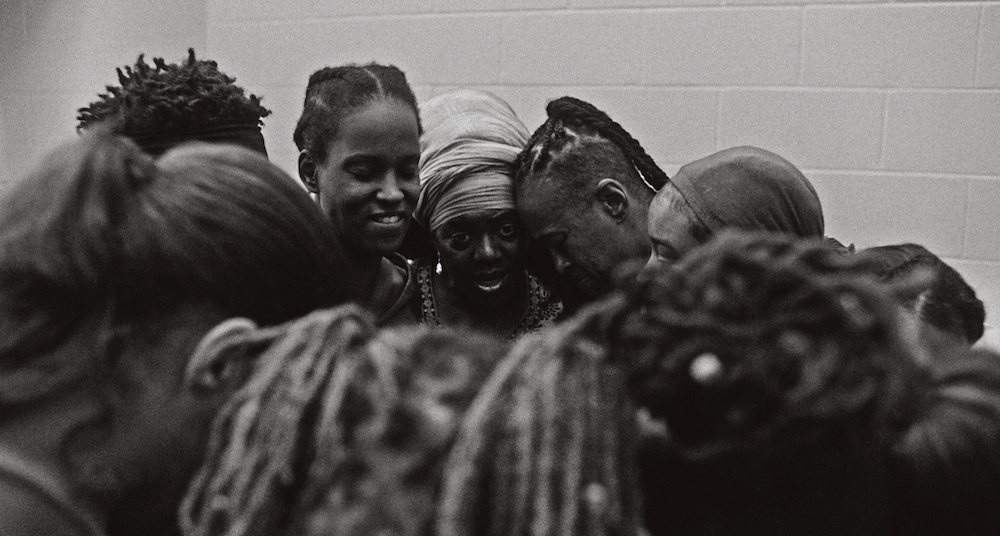When Maryam Henderson-Uloho got out of prison, she could not get a driver’s license, a bank account, a credit card or anything else she needed to start her life over again. After being institutionalized for 13 years, Henderson-Uloho has found a way to start over and help others who are in the same situation. As the owner of Sisterhearts Thrift Store in New Orleans, Henderson-Uloho employs former felons and helps them transition from prison to society. The thrift store assists these ex-cons to get out of the mindset of being told what to do every day. Here, they have to think for themselves and make decisions on the cost of an item, how it’s displayed and how to get more information on it (usually via Google).
Mohammad Gorjestani’s profile documentary “Sister Hearts” tell’s Henderson-Uloho’s story and follows her through a typical day. Her employees have a place to stay above the store. She makes them breakfast and gets them on their feet. She also visits with inmates in the correctional facilities and helps guide them through mental exercises so that they don’t fall under the spell of feeling worthless or dejected from the world.
Henderson-Uloho’s story is told in in beautiful black-and-white by cinematographer Isiah Donte Lee until the final moments when the film shifts into the world these women now inhabit, far from the confinement of a prison cell. It is a quiet, celebratory moment when the film shifts to the perspective of the former inmates and what they have gained from being in Henderson-Uloho’s presence. The color shift makes the final act more than just a standard collection of testimonials.
Henderson-Uloho is a perfect subject for a short profile documentary. Charismatic, inspiring, gentle and determined and Gorjestani captures her essence perfectly, making us wish we had someone like that in our own lives, whether we need it or not.

How did you find your subject?
This film was the fourth film I directed in a larger series titled “For Every Kind of Dream” that has been a collaboration between Square and Even/Odd Films. The genesis of the series was rooted in examining the complexity and breadth of the contemporary “American Dream” by looking at it from the point of view of people who started a business, often in underserved areas, as a way to overcome significant adversity and build something from it for themselves and their communities.
After making films about a Syrian Immigrant, Native American youth, and a former factory town in Iowa, we decided explore the urgent issue of incarceration and re-entry. If you want to go to the epicenter of that, you go to Louisiana; Louisiana is the incarceration capital of not only America, but the world. Our aim was to find a story that had an unexpected quality to it at some level. We found an unassuming thrift store that was started by a formerly incarcerated woman just outside New Orleans that is also a re-entry facility for women. We found this fascinating with a “diamond in the rough” kind of vibe to it. We had a Skype chat with Maryam and felt we needed to go out to New Orleans to check it out ourselves and scouted the story. Once we met Maryam in real life, and first walked into SisterHearts, it was pretty much a done deal.
How long were you with her and the former inmates? And how did you gain their trust?
It all starts with Maryam. It was important to gain Maryam’s trust, because when you make films like this it needs to be a collaboration with your subject where you are both able to trust each other. With Maryam, we were very transparent about what we wanted to do and shared the three prior films in the series with her. I shared a few other films I have made as well, including “Happy Birthday Philando Castile” which she really gravitated towards. But above all that was going out to meet her and spend time with her. She’s an intuitive person and I think that one-on-one time was in many ways about solidifying that bonding and trust that we were going to take good care of her story.
In terms of filming in Orleans Parish Prison, we were inside the walls for only about three to four hours. It took a few weeks of coordinating, Erik Kwiecien and Taylor Feltner, who are producers on the film were instrumental in navigating the initial red tape and getting a dialogue going. But what helped us the most was Maryam and her reputation, we just piggybacked on her and when in doubt or if we hit a wall, we said either “we’re with Maryam” or “this is what Maryam wants to do.” Once we were granted access, we went in with the mentality that we are guests of not only the prison, but of the inmates as well. The Prison respects Maryam and the work she’s doing immensely, and so do the inmates, because she was one of them and did some very hard time. She’s someone who’s walked in their shoes before— she’s been there. And you can see this in the film in how Maryam commands the respect of the room. You can see her words etch away at the hard exterior of these women at the beginning of the film and by the end they all reveal their spirit and unspoken bond, forming a group hug that you could feel through the screen.

What went into the decision to start with black-and-white and shift to color?
I remember early on in our discussions Maryam talking about how when you re-enter society you are almost in a different reality than everyone else. And she articulated it in a way that really stuck with me and I began to think about how that could also inspire the visual language of the film. Black and white portrays the world in a very familiar way, but you and I live in a world of color. In a way, the black and white created some separation from reality and was a nod at the “different reality” Maryam was referencing. But going back to color was a very intentional way of trying to remind us, the civilians, that in fact Maryam’s story and Sister Hearts is happening in the same world as ours. We come up to color when Ko, one of the “Sister Hearts,” looks directly at us and speaks to us for the first time along with two other Sister Hearts. I think the combination of coming up to color and the direct-address placed the viewer in a different emotional place and brought a presence that I felt was important to do as the film came to its falling action.
What was the response like at the SXSW Film Festival (or the response in general)?
It’s been wonderful. You always have that insecurity when you work on something for a long time and then place it out in the world. You know, the “are people gonna like this” kinda stuff. SXSW was great, we had a lot of great feedback from people who saw the film at the screenings and other filmmakers as well. Square then organized a screening at Orleans Parish Prison (the same prison we filmed in) which was really special, and then they also put together a really great public premiere in New Orleans that brought out the Mayor Elect, local leaders, and the community. Jack Dorsey, Square’s CEO, was also present and shared some words at the screening in the Prison and at the public premiere along with Shaka Senghour and Topeka Sam of #Cut50, an organization dedicated to cutting down the prison population. That was very meaningful to everyone from Maryam to the women we screened the film for in prison. When people like that show up you feel more seen and valued as an individual. You feel less forgotten and that’s a big piece of the rehabilitation process Maryam talks about in the first place. That was fun to be a part of and see.
On a creative level, it’s been great to see people pick up on the nuances of the film including the fact that we never discuss why Maryam went to prison, for what, etc. We felt that was just a curious itch and actually a disservice to the intent of the films message which is that everybody deserves a fair second chance and that you are not defined by your incarceration. It’s validating to have people come up to you and appreciate that.
What I’ve really loved is how much Maryam appreciates the film and is going to use it as a tool to continue to grow SisterHearts. She’s getting more donations and more volunteers at SisterHearts and has been partnering with great organizations to help her cause. It feels good to know we were a small catalyst in her newfound growth.

What’s next for you?
I’m working on my first feature film with the support of SFFilm who has generously given me two KRF grants in support of my projects. The film is based on a short I made a few years ago titled “Refuge” which played at Tribeca and SXSW. You can see online on Vimeo. It’s a near future drama that with the backdrop of Silicon Valley and follows an intrepid Iranian girl who makes a deal with the devil to try and avoid deportation. Aside from that I’m continuing to also work and write other original projects and hope to make a few music videos this year too to keep things fun.












